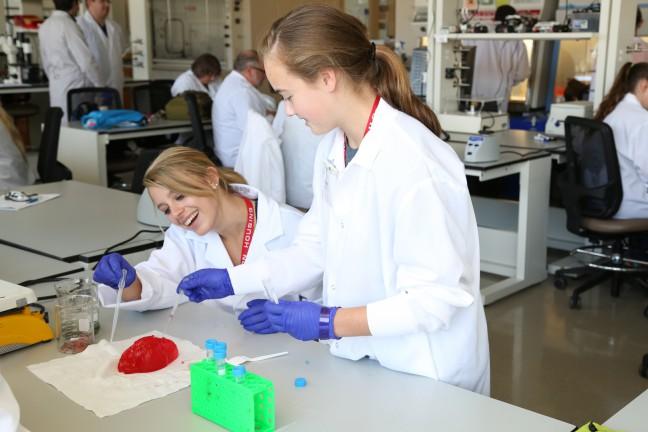Last month, University of Wisconsin genetics professor Ahna Skop was selected to be an IF/THEN Ambassador by the American Association for the Advancement of Science.
The IF/THEN initiative seeks to increase the platform of women working in STEM to inspire young girls nationally, and ambassadors are named based on their contributions to their field of work and their ability to engage others in science. Skop, whose research spans from cell division to scientific art, has long been involved with STEM outreach on campus, specifically in advocating for underrepresented groups in STEM.
According to the United Nations Educational, Scientific and Cultural Organization, only 30% of the world’s researchers are women, and despite the fact that women make up half of the college-educated workforce in the U.S., just 25% of women actually work in STEM.
Many credit this glaring gender disparity in what is currently considered one of the most lucrative and essential lines of work to a lack of female role models in STEM. Given that only 21 women have won the Nobel Prize in the sciences in the history of the award, it should come as no surprise that young girls and women in higher education feel discouraged from pursuing careers in such male-dominated work.
Women feel extra pressure to prove themselves in male-dominated majors
This is why initiatives like IF/THEN are so important — young girls and women must see that STEM can include them by learning from other women who have succeeded in this field, like Skop.
Research has actually shown there is a correlation between having a role model currently working in STEM and increased interest in this field for young girls. Last year, Microsoft found that when girls had a STEM mentor that inspired them, their interest in pursuing STEM nearly doubled.
The “#SheCanSTEM” campaign was created by the Advertising Council along with General Electric, Google, IBM, Microsoft and Verizon to draw attention to women employees because, according to the campaign’s website, “Girls can’t be what they can’t see.”
Although it may seem like a catchy hashtag, it resonates especially with students like myself, whose STEM classes are made up of nearly all men, including teaching assistants and professors. Drawing on my own personal experience, it can feel disheartening to be starkly outnumbered in these discussion sections and lectures.
Recognizing economic, gender disparities essential for equity in education
Bringing attention to female researchers like Skop is essential for students who don’t have close mentors who understand how difficult it can be to be underrepresented in class.
As Skop said, many students tend to envision those in STEM to look like an “old, white male scientist in a lab coat with glasses,” which is actually a far cry from the women she sees “doing amazing science … all the time.” The more attention we bring to these women, the less female students will feel out of place in male-dominated STEM classes.
Still, for young girls and female students who are already committed to their STEM pursuits, there is a long way to go before women are as readily welcome in STEM as men are. Teachers and professors must be active in fostering female students’ interest in STEM, as well as remedying the gender disparities among students in discussion and lecture sections.
While having more diverse role models in STEM to look up to is a start, it does not address the lack of awareness men in STEM classes and jobs may have of the daily struggles underrepresented groups face. Until male counterparts support women in STEM as much as women like Skop and those featured in other initiatives do, women will continue to feel as though they do not belong in STEM, when, in fact, they most certainly do.
Anne Isman ([email protected]) is a freshman studying economics.




















